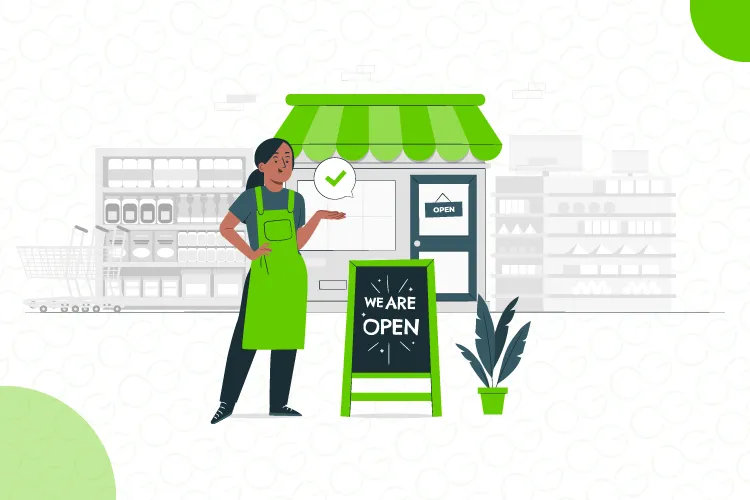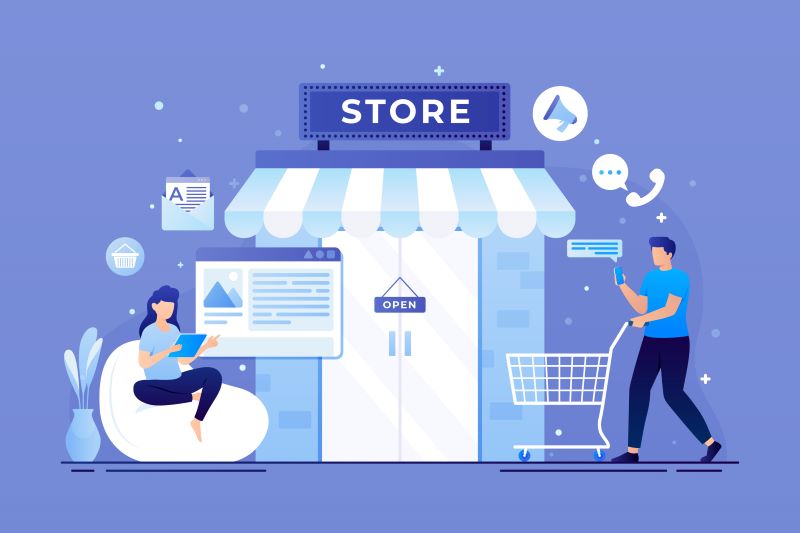Why are D2C Brands Opening Offline Stores and How Ginesys One Can Help?

The Direct-to-Consumer (D2C) model has revolutionized the retail landscape. By cutting out the middleman, D2C e-commerce platforms have established a direct relationship with customers, offering products exclusively online. However, according to the recent trend several new D2C companies are taking the offline route much earlier than their predecessors. This shift marks an interesting evolution in the D2C offline retail, prompting the question: why are these digitally native brands opening brick-and-mortar locations?
In this blog, we will explore the reasons behind this trend and its implications for the future of retail.

From clicks to bricks: The D2C revolution expands offline
The Evolution of D2C Brands
The D2C wave in India has been nothing short of revolutionary. According to industry estimates, over 800 D2C e-commerce platforms are operating in India, with the market predicted to reach $60 Billion by 2027. The D2C model has enabled small startups to build brands quickly. Low customer acquisition costs and direct customer feedback loops have fueled rapid iteration and innovation. They bypassed traditional retail channels, reaching consumers directly through their websites and social media platforms.
As these brands grew, so did their customer base and expectations. The evolution from purely online to offline presence is a natural progression for many D2C e-commerce platforms seeking to expand their reach. According to a report by the International Council of Shopping Centers (ICSC), opening a physical store leads to a 37% increase in overall web traffic for a brand within the same market area. This statistic underscores the symbiotic relationship between online and offline channels for D2C brands.
Let's understand this shift in more detail with the following case study.
Peachmode started as an online-only store and quickly gained a loyal customer base with its unique, sustainable fashion offerings. Over the years, the brand has expanded into physical retail, opening several flagship stores across key cities. From its first store launch, Peachmode now boasts over a dozen physical locations, providing customers the opportunity to experience its products in person. This strategic move to a hybrid model has strengthened Peachmode's market presence, allowing it to cater to a broader audience and enhance its brand experience.
Snitch has opened six physical stores in Bengaluru, Vadodara, and Surat. It plans to open 30 more by the end of this year in other metropolitan cities. Siddharth Dungarwal, founder of Snitch, said the company is seeing conversion rates of 50-60% in its stores compared with 3-4% on its website. It is also two to three times higher Average Order Value (AOV) in stores than what a customer generally spends online.

From Screen to Storefront: D2C Brands Embrace Offline Expansion
Reasons D2C Brands Are Opening Offline Stores
- Building Brand Awareness and Trust: D2C offline retail offers a tangible experience, helping brands build trust and authenticity. When customers can see, touch, and feel products, it creates a deeper connection and reinforces brand credibility.
- Community Building: Offline stores provide a space for brands to engage directly with their community. Hosting events, workshops, and in-store experiences draws foot traffic and creates memorable experiences that encourage repeat visits and word-of-mouth promotion.
- Customer Acquisition: Shoppers who prefer traditional retail or happen to pass by can discover the brand and make impulse purchases. These new customers might not have encountered the brand online, making physical stores a vital part of customer acquisition strategies.
- Market Penetration and Expansion: Opening physical stores in key locations allows the D2C e-commerce platform to penetrate new markets more effectively. This localized approach helps in building a stronger market presence and expanding the customer base.
- Basket Size: A typical in-store shopper has a larger basket size compared to an online shopper, as many articles might catch their fancy due to the interesting display, ease of trying it out, and materials that are visible as luxurious or interesting.
- Conversion rates: An offline store has a higher conversion rate than a webstore under normal sales and off-sales periods as shoppers usually only enter a store when they want to buy something.
- Omnichannel Synergy: Combining online and offline channels creates a seamless shopping experience, known as omnichannel retail. Customers can enjoy the convenience of shopping online with the added benefit of in-store services like pick-up, returns, and personalized assistance.
Cost Efficiencies: Establishing offline distribution networks leads to cost efficiencies compared to pure e-commerce models, which rely heavily on last-mile delivery. Brands can optimize inventory management, reduce shipping costs, and benefit from economies of scale.

Essentials for Opening a D2C Physical Store
1. Physical Infrastructure of the Store
- Location and Layout Considerations- Choosing the right location is critical for the success of a physical store. High foot traffic areas, target demographics, and accessibility are key factors. The layout should facilitate easy navigation, product visibility, and a pleasant shopping experience.
- Store Design Reflecting Brand Identity- The store’s design should be an extension of the brand’s online presence. Consistent branding, from color schemes to signage, ensures a cohesive customer experience.
2. Technology and Software Integration
- Importance of POS (Point of Sale) Systems- A robust POS system is essential for efficient transactions and inventory management. It ensures smooth checkouts, accurate sales tracking, and real-time inventory updates, providing valuable data for decision-making.
- Integration with ERP (Enterprise Resource Planning) Software- Integrating POS systems with ERP software streamlines operations by synchronizing sales, inventory, and financial data. This integration enhances efficiency, reduces errors, and provides a comprehensive view of the business.
- Role of D2C e-commerce Platforms and Software- Leveraging e-commerce platforms and software in physical stores ensures a seamless omnichannel experience. These tools enable unified customer profiles, personalized marketing, and consistent service across all touchpoints.
Ginesys One: A Comprehensive Solution
In the evolving landscape of retail, D2C e-commerce platforms are increasingly recognizing the need for a strong offline presence to complement their digital operations. One of the key enablers of this transition is the adoption of robust ERP and POS solutions like Ginesys. Ginesys One integrates various functions, such as inventory management, sales processing, financial accounting, and customer relationship management, into a single cohesive platform. This integration facilitates seamless operations, real-time data access, and better decision-making, making it an ideal choice for D2C brands venturing into the offline market.
Features and Benefits for D2C Brands
- Unified Retail Management: Ginesys One provides a unified platform that combines ERP and POS functionalities, enabling D2C e-commerce platforms to manage their online and offline operations from a single system. This integration ensures consistency in inventory, pricing, and promotions across all channels, enhancing the customer experience and operational efficiency.
- Real-Time Inventory Management: For D2C brands, maintaining optimal inventory levels is crucial to avoid stockouts or overstock situations. Ginesys One offers real-time inventory tracking and management, allowing brands to monitor stock levels, track product movement, and automate replenishment processes.
- Managing Retail Promotions: Ginesys Retail Management offers a flexible and powerful promotion or discount management system that makes it easy to run multiple offers across your chain of stores.
- Streamlined Sales Processing: Ginesys simplifies the sales process with its advanced offline and cloud POS systems. It supports various payment methods, including cash, card, and digital wallets, ensuring a smooth and convenient checkout experience for customers. Additionally, the POS system is equipped with features like billing, discount management, and loyalty programs.
- Comprehensive Financial Management: Managing finances effectively is vital for the sustainability of any business. Ginesys offers robust financial management modules through its ERP, including accounts payable and receivable, general ledger, and financial reporting. These tools provide the D2C e-commerce platform with accurate and real-time financial data.
- Enhanced Customer Relationship Management: Ginesys One is integrated with CRM software that enables brands to capture customer data, track purchase history, and analyze buying behavior. This information can be used to personalize marketing campaigns, offer targeted promotions, and improve customer service, thereby fostering stronger customer relationships.
- Scalability and Flexibility: As D2C brands expand their offline presence, scalability and flexibility become critical. Ginesys is designed to scale with the growth of the business, accommodating new store openings and increased transaction volumes seamlessly. Its flexible architecture allows customization to meet specific business needs.
- Data-Driven Insights: Ginesys One provides powerful analytics and reporting tools that offer valuable insights into various aspects of the business, such as sales performance, inventory turnover, and customer preferences. These insights enable D2C e-commerce software to make data-driven decisions, optimize operations, and identify new growth opportunities.
Challenges and Solutions by Ginesys
| Features | Challenges | Solutions |
|---|---|---|
Managing CostsBudgeting and financial planning
| Cost management for store setup
| Maintaining Consistency Across ChannelsEnsuring brand consistency online and offline
|
Strategies for cohesive omnichannel experiences
| Data Integration and UtilizationLeveraging data from both online and offline sources
| Improving customer insights and personalization
|

Empower your retail: Ginesys unleashes seamless D2C expansion
The retail landscape is evolving, and the future of the D2C e-commerce platform lies in an integrated omnichannel approach. As consumers increasingly seek convenience and personalized experiences, brands that successfully blend online and offline touchpoints will thrive. Opening a physical store is not just about increasing sales but also about creating a holistic brand experience that resonates with customers on a deeper level.
Ginesys One emerges as a comprehensive solution that integrates ERP, POS, and e-commerce management functionalities, catering to the unique needs of D2C brands. By offering a unified platform for managing online and offline operations, Ginesys One ensures consistency in inventory, pricing, and promotions, enhancing both customer experience and operational efficiency.
Ready to elevate your D2C e-commerce platform with a seamless omnichannel experience? Contact us today to discover how Ginesys One can help you thrive in the evolving retail landscape.
